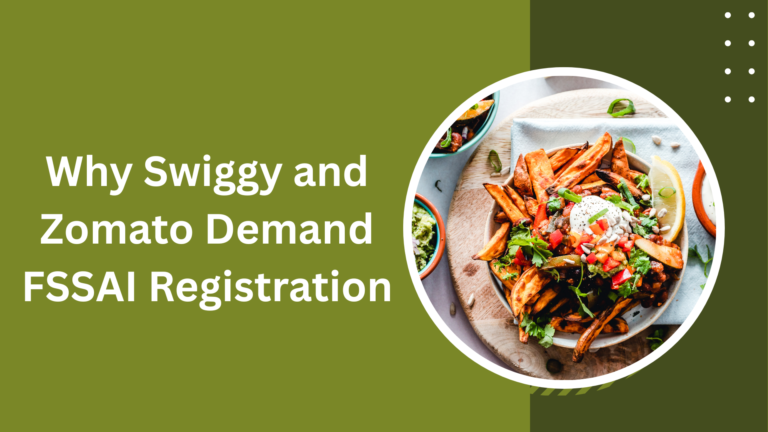In the digital era of on-demand food delivery, platforms like Swiggy and Zomato have revolutionized how we dine. These online food delivery giants connect millions of customers to restaurants, home kitchens, cloud kitchens, and food entrepreneurs. But before any food business can list on these platforms, they must comply with a crucial requirement — FSSAI Registration.
Swiggy and Zomato mandate FSSAI Registration for all food sellers and partners on their platforms. Why is this registration so important, and what role does it play in ensuring food safety and legal compliance? This article breaks down the importance of FSSAI Registration and why it’s a non-negotiable requirement for sellers on Swiggy and Zomato.
What Is FSSAI Registration?
FSSAI stands for the Food Safety and Standards Authority of India, a government body under the Ministry of Health and Family Welfare. It is responsible for regulating and supervising food safety standards in India.
All food businesses — whether manufacturers, processors, transporters, or sellers — are required by law to obtain FSSAI Registration or License, depending on the scale and nature of their operations.
The license ensures:
- The food being served is safe, hygienic, and legally compliant
- The business adheres to quality control and food safety standards
- The business is accountable under the FSSAI Act, 2006
Businesses can apply for the license via the FSSAI registration portal, a centralized system for issuing food safety certificates.
Why Swiggy and Zomato Insist on FSSAI Registration
Both Swiggy and Zomato follow strict guidelines to ensure that the food served via their platforms is safe for consumption. Here’s why FSSAI Registration is mandatory:
1. Legal Compliance
Under the Food Safety and Standards Act, 2006, it is mandatory for any food-related business to be registered or licensed by FSSAI. Swiggy and Zomato are legally obligated to onboard only those restaurants or food sellers who comply with this law.
By requiring FSSAI registration, these platforms mitigate the risk of legal action against them and ensure that all food partners operate within the legal framework.
2. Consumer Safety and Hygiene
Consumer trust is the cornerstone of online food delivery. FSSAI ensures that food is prepared, stored, and delivered hygienically and is free from contamination or harmful additives.
Swiggy and Zomato rely on FSSAI certification as a trust signal that the food sellers meet essential safety and hygiene standards, reducing the risk of food poisoning or health hazards.
3. Brand Reputation and Customer Trust
Platforms like Swiggy and Zomato operate on public trust. A single instance of contaminated food or a customer falling sick can go viral and damage the platform’s reputation.
By enforcing FSSAI registration, they:
- Show commitment to consumer health
- Create a safe ecosystem for food lovers
- Protect their brand image
Having an FSSAI-registered seller base helps Swiggy and Zomato maintain high food quality assurance standards.
4. Accountability and Traceability
In case of food-related complaints, FSSAI license details allow quick identification and tracing of the source. It also helps take corrective action against repeat offenders.
Swiggy and Zomato use the FSSAI license to:
- Track the food business in question
- Report serious incidents to FSSAI
- Ensure vendors take responsibility for food safety lapses
Without FSSAI registration, tracing the source of poor-quality or hazardous food becomes a challenge.
5. Boosting Platform Credibility
FSSAI compliance is also a marketing and trust tool. Many consumers check whether a food provider is FSSAI registered before ordering. Swiggy and Zomato showcase the FSSAI license number on restaurant profiles and digital menus.
This transparency:
- Boosts consumer confidence
- Attracts health-conscious users
- Improves the overall credibility of the platform
Who Needs FSSAI Registration on Swiggy and Zomato?
Any individual or business intending to sell food on Swiggy or Zomato must register with FSSAI, including:
- Restaurants
- Home chefs
- Cloud kitchens
- Caterers
- Tiffin services
- Food trucks
- Bakeries
- Juice corners
Even if you’re operating from home or a small setup, you still need a Basic FSSAI Registration (for turnover less than ₹12 lakhs per year). Larger operations may require a State or Central FSSAI License.
Displaying FSSAI License on Swiggy/Zomato
Once approved, your FSSAI license number must be:
- Displayed on your restaurant or cloud kitchen profile
- Printed on food invoices and packaging
- Available for inspection on request
Also Read: FSSAI License for Fish Exporters in India
Conclusion
Swiggy and Zomato’s requirement for FSSAI Registration is not just about legal compliance — it’s about building a safe, transparent, and trusted food ecosystem for consumers. Whether you’re a small home-based food entrepreneur or a large restaurant chain, having an FSSAI license is your first step toward professionalism and credibility in the online food delivery space.
By registering on the FSSAI registration portal, food businesses can ensure compliance, attract more customers, and build long-term partnerships with India’s top food delivery platforms. If you want to start or grow your food business on Swiggy or Zomato, FSSAI Registration isn’t optional; it’s essential.



